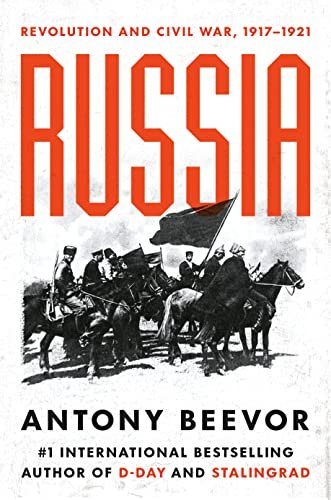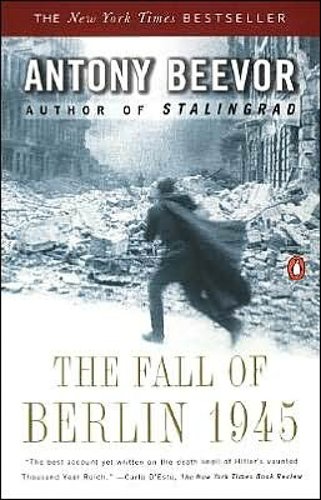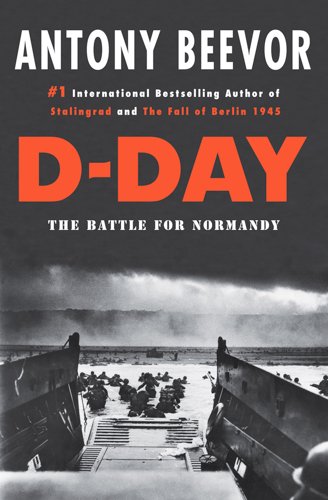Antony Beevor
Antony Beevor is the author of Crete - The Battle and the Resistance, which won a Runciman Prize, Paris After the Liberation, 1944-1949 (written with his wife Artemis Cooper), Stalingrad, which won the Samuel Johnson Prize, the Wolfson Prize for History, and the Hawthornden Prize for Literature, Berlin - The Downfall, which received the first Longman-History Today Trustees' Award, and The Mystery of Olga Chekhova. Stalingrad and Berlin have been translated into twenty-five languages and sold more than two and a half million copies between them. He was then the editor of A Writer at War - Vasily Grossman with the Red Army 1941-1945, a compilation of the great novelist's wartime notebooks. His latest book is The Battle for Spain, a completely new edition of his 1982 book on the Spanish Civil War. In September 2005, as La Guerra Civil Española, it went straight to become the No. 1 Bestseller in Spain. He has recently stepped down as chairman of the Society of Authors. He was given an honorary doctorate by Kent University, and is a visiting professor at the School of History, Classics and Archaeology at Birkbeck College, University of London.
His book Stalingrad was awarded the Samuel Johnson Prize for Non-fiction, the Wolfson History Prize, and the Hawthornden Prize in 1999. It became a No. 1 Bestseller both in hardback and paperback, the UK edition alone selling half a million copies, and has been published around the world in twenty-one translations. Berlin: The Downfall 1945 has dominated the bestseller lists even more than Stalingrad. Most of his titles are published by Penguin.
Antony Beevor is a Fellow of the Royal Society of Literature and a Chevalier de l'Ordre des Arts et des Lettres in France.
For more information about Antony Beevor:
News
Antony Beevor’s newest book, Russia: Revolution and Civil War, 1917-1921, out now with Viking.
Books
Russia: Revolution and Civil War, 1917-1921
An epic new account of the conflict that reshaped Eastern Europe and set the stage for the rest of the twentieth century.
Between 1917 and 1921 a devastating struggle took place in Russia following the collapse of the Tsarist empire. The doomed White alliance of moderate socialists and reactionary monarchists stood little chance against Trotsky’s Red Army and the single-minded Communist dictatorship under Lenin. In the savage civil war that followed, terror begat terror, which in turn led to ever greater cruelty with man’s inhumanity to man, woman and child. The struggle became a world war by proxy as Churchill deployed weaponry and troops from the British empire, while contingents from the United States, France, Italy, Japan, Poland, and Czechoslovakia played rival parts.
Using the most up to date scholarship and archival research, Antony Beevor assembles the complete picture in a gripping narrative that conveys the conflict through the eyes of everyone from the worker on the streets of Petrograd to the cavalry officer on the battlefield and the doctor in an improvised hospital.
(Viking, September 2022)
Ardennes 1944
Antony Beevor's riveting new book Ardennes 1944 reconstructs the Battle of the Bulge in World War II.
On 16 December, 1944, Hitler launched his ‘last gamble’ in the snow-covered forests and gorges of the Ardennes. He believed he could split the Allies by driving all the way to Antwerp, then force the Canadians and the British out of the war. Although his generals were doubtful of success, younger officers and NCOs were desperate to believe that their homes and families could be saved from the vengeful Red Army approaching from the east. Many were exultant at the prospect of striking back.
(Penguin Books, November 2015)
The Fall of Berlin 1945
Acclaimed for his vivid re-creations of some of the twentieth century's most significant battles, Antony Beevor is one of the best known and respected military historians writing today. He now offers readers a gripping, street-level portrait of the harrowing days of January 1945 in Berlin when the vengeful Red Army and beleaguered Nazi forces clashed for a final time. The result was the most gruesome display of brutality in the war, with tanks crushing refugee columns, mass rapes, pillage, and destruction. Hundreds of thousands of German civilians froze to death or were massacred because Nazi officials had forbidden their evacuation. Hitler, half crazed in his bunker, issued wild orders while Stalin was prepared to risk any number of his men to seize the city before the other Allies could get there.
Making full use of newly disclosed material from former Soviet files as well as from German, American, British, French, and Swedish archives, Beevor has reconstructed the different experiences of those millions caught up in the death throes of the Third Reich. The Fall of Berlin 1945 depicts not only the brutality and desperation of a city under siege but also rare moments of extreme humanity and heroism. This account also contains new revelations about the motives behind Stalin's hurried assault. Sure to appeal to all readers interested in military history and the Second World War, The Fall of Berlin 1945 promises to be the definitive treatment of the subject for years to come.
(Viking, May 2002)
The Battle For Spain: The Spanish Civil War 1936-1939
The Battle for Spain is a compelling account of one of the most hard-fought and bitter wars of the twentieth century: a war of atrocities and political genocide that was a military testing ground before the Second World War for the Russians, Italians, and Germans.
With his thorough and contemporary examination of the Spanish civil war, historian Antony Beevor unravels the complex events from the coup d'etat which started the war in July of 1936 to the final defeat of the Republicans in 1939. This highly readable account leaves out none of the familiar aspects, exploring them with a clear eye and providing important new insights into the war--its causes, course, and consequences.
(Penguin, June 2006)
Stalingrad: The Fateful Seige 1942-1943
Historians and reviewers worldwide have hailed Antony Beevor's magisterial Stalingrad as the definitive account of World War II's most harrowing battle. In August 1942, Hitler's huge Sixth Army reached the city that bore Stalin's name. In the five month siege that followed, the Russians fought to hold Stalingrad at any cost, then caught their Nazi enemy in an astonishing reversal. As never before, Stalingrad conveys the experience of soldiers on both sides as they fought in inhuman conditions, and of civilians trapped on an urban battlefield. Antony Beevor has interviewed survivors and discovered completely new material in a wide range of German and Soviet archives, including reports of prisoner interrogations, desertions, and executions. The battle of Stalingrad was the psychological turning point of World War II; as Beevor makes clear, it also changed the face of modern warfare. As a story of cruelty, courage, and human suffering, Stalingrad is unprecedented and unforgettable.
(Penguin Books, May 1999)
D-Day: The Battle for Normandy
D-DAY: The Battle for Normandy is the first major account in over twenty years to cover the whole invasion from June 6, 1944 right up to the Liberation of Paris on August 25th. It is the first book to describe not only the experiences of the American, British, Canadian, and German soldiers, but also the terrible suffering of the French caught up in the fighting. More French civilians were killed by Allied bombing and shelling than British civilians by the Luftwaffe.
The Allied fleet was by far the largest amphibious assault ever attempted, and what followed was a battle as savage as anything seen on the Eastern Front. Casualties mounted on both sides, as did the tensions between the principal commanders. Even the joys of Liberation had their darker side. The war in northern France marked not just a generation, but the whole of the postwar world, profoundly influencing relations between America and Europe.
Beevor draws upon his research in over thirty archives in six countries, going back to original accounts, interviews conducted by combat historians just after the action, and many diaries and letters donated to museums and archives in recent years.
D-DAY will surely be hailed as the consummate account of D-Day and the ferocious offensive that led to the Liberation of Paris.
(Viking/Penguin, October 2009)






